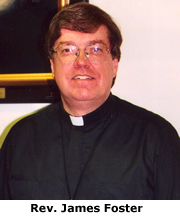
Since 1943, Notre Dame has given special attention to students whose postgraduate plans included medical or dental school. Part of this assistance involved the development of preprofessional programs that pair a strong but general core of science courses with classes in the social sciences and humanities. Another part has involved advising and assistance with applications.
As new as the Jordan Hall of Science itself is a revised approach to preparing those students, and a new director: Rev. James Foster, C.S.C., who also is a physician. In addition to leading the preprofessional program for the College of Science, he is director of the newly named Center for Health Sciences Advising.
This consolidated service responds to several developments in the health care field. First, says Father Foster, a service that advises only medical and dental school applicants is a bit narrow in scope. What about students who want to be optometrists or physical therapists?
Also, the process of building an application for the health services professions is becoming more competitive and complex. Students now are encouraged to have a summer service background or an undergraduate research experience. Future dentists are encouraged to have shadowed a practicing professional, Father Foster says.
Now, under one roof on the second floor of Jordan, Father Foster shares office space with fellow advisors Kathleen Kolberg, Jennifer Nemecek and the undergraduate research coordinator, Michelle Whaley. Kolberg, an assistant dean of the College of Science, works with science majors who plan to attend one of the professional schools but who are forgoing the preprofessional program for traditional majors such as biology. Nemechek advises Arts and Letters majors. Whaley helps coordinate undergraduate research projects for College of Science majors.
“It’s like a home,” Kolberg says. “It belongs to everyone who wants to go into medicine and the health professions.”
With their strong interest in service and their clear intellectual capacity, Notre Dame students are attractive prospects to health care professional programs. Some 80 percent of Notre Dame students who apply to medical school are accepted, compared to the approximate 45 percent nationally, Father Foster says.
The task of helping students become attractive candidates over a four-year period — candidates who combine strong academics, service and research — draws on Father Foster’s skills both as a priest and a former practicing physician.
“These students are born jugglers,” he says. "Of course they’re intelligent. They’re driven to work with people. They want to be challenged every day, and gain a deeper understanding of how scientific principles are applied clinically.
“They are eager young idealists who want to help and are just learning to do that in concrete ways.
As much as preparing them for a life in health care, the advising component will address the student question: “How do I make that my passion?”
Originally published by at newsinfo.nd.edu on October 11, 2006.